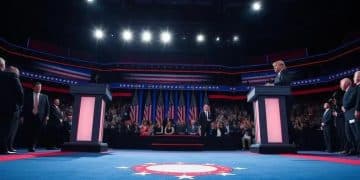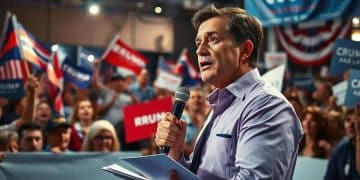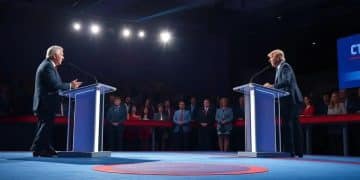Want presidential debate coverage? Here’s what to expect

The impact of social media on debate perception is significant, as it enables real-time reactions, allows influencers to shape opinions, and creates echo chambers that reinforce existing beliefs among viewers.
Are you ready for the next big event? Want presidential debate coverage? Understanding what to expect can enhance your viewing experience and keep you engaged in the political landscape. Let’s dive in!
Key issues likely to be discussed in the debate
In the upcoming debate, several key issues are likely to be at the forefront of discussion. Understanding these topics can help you follow along and engage more deeply with the discourse. Let’s explore the significant issues to expect.
Economic Policies
One of the main concerns voters have is economic policies. Candidates will discuss their views on taxes, spending, and job creation. These policies greatly influence everyday life.
- Tax reform proposals
- Plans for job growth
- Economy recovery strategies
Healthcare
Healthcare remains a crucial issue for many families. Candidates will outline their visions for improving the healthcare system, focusing on accessibility and affordability.
- Insurance coverage options
- Prescription drug costs
- Public health initiatives
As we move through the debate, the candidates’ contrasting views on various issues will be particularly noteworthy. Each candidate aims to present solutions that resonate with the audience.
Climate Change
The issue of climate change will undoubtedly gain attention. Candidates will have differing policies on how to address environmental concerns while balancing economic growth.
- Renewable energy initiatives
- Regulations on pollution
- International climate agreements
Voters are eager to hear how candidates plan to face these challenges. It is essential to consider their proposed solutions and how they align with your own values.
As the debate unfolds, remember that these key issues shape our future. Engaging in dialogue about them will help create a more informed electorate.
How to prepare for watching the debate

Watching a presidential debate can be an exciting experience. To make the most of it, there are several ways you can prepare for watching the debate. Being informed and ready can enhance your understanding of the candidates’ positions.
Know the Key Issues
Before the debate, take time to learn about the key issues that are likely to be discussed. Familiarizing yourself with these topics allows for more meaningful engagement during the debate.
- Research current events related to the election.
- Understand the candidates’ platforms and backgrounds.
- Follow expert analyses and predictions.
Your knowledge about these issues will not only help you understand the candidates better but also prepare you for any surprises during the debate.
Create a Comfortable Viewing Environment
A good viewing environment can make a big difference. Make sure to set up your space so you can focus on the debate without distractions. Consider inviting friends or family who may have different viewpoints.
- Find a quiet place with a good view of the screen.
- Prepare snacks and drinks for an enjoyable experience.
- Use comfortable seating to stay relaxed throughout the debate.
Remember, engaging with others can spark interesting conversations about the candidates’ performances and the issues presented.
Plan Ahead for Questions
As the debate unfolds, keep a notepad handy. Take notes on what stands out to you. Having questions prepared can enhance your viewing experience.
- What policies resonate with you?
- Are there any statements that need further clarification?
- How do the candidates’ responses compare to your expectations?
By jotting down your thoughts, you can contribute to discussions with friends or share your opinions online.
Analyzing the candidates’ communication styles
As the debate progresses, analyzing the candidates’ communication styles can reveal their strengths and weaknesses. Each candidate has a unique way of engaging with the audience that greatly affects their message perception.
Body Language
Non-verbal communication plays a significant role in how candidates are perceived. Their gestures, posture, and eye contact convey confidence and credibility. Consider how each candidate uses body language to emphasize their key points.
- Gestures to highlight important statements.
- Posture that conveys confidence or hesitation.
- Eye contact that establishes connection with viewers.
Watch for these cues, as they can indicate how candidates feel about their messages and audience engagement.
Speaking Skills
Another area to pay close attention to is a candidate’s speaking skills. This includes their tone, pace, and clarity. How effectively they articulate their ideas can influence how well their points resonate with voters.
- Clear and concise language that avoids jargon.
- Tonal variation that keeps the audience engaged.
- Pacing that allows ideas to sink in.
Evaluate whether candidates can deliver their points convincingly. An effective communicator can break down complex topics into easily digestible information for the viewer.
Handling Questions
How candidates respond to questions and challenges is also important. Do they stay calm under pressure? Are they able to pivot or redirect tough questions effectively? This reveals their ability to think on their feet and respond thoughtfully.
- Use of anecdotes or examples to support answers.
- Clarifying questions to ensure understanding.
- Staying composed during interruptions.
Throughout the debate, observe how each candidate manages their responses. This aspect of their communication can showcase their leadership potential and readiness for the position.
Impact of social media on debate perception

The impact of social media on debate perception is significant in today’s digital age. Social media platforms allow users to share their opinions and engage in discussions about the candidates and the issues presented during debates.
Real-time Reactions
One of the major ways social media influences perception is through real-time reactions. Viewers often post their thoughts and feelings while watching the debate, which can shape the conversation almost instantly.
- Live tweets can create a sense of urgency.
- Memes and gifs provide humor and commentary.
- Polls on social media can gauge public opinion quickly.
This immediate feedback allows users to see how others are reacting and might affect their own views on the candidates.
Influence of Influencers
Another important aspect is the role of social media influencers and political commentators. Influencers have large followings and can sway opinions with their commentary and analysis.
- They provide interpretations of candidates’ performances.
- Many followers trust their opinions and may adjust their views accordingly.
- Influencers often highlight specific issues that resonate with their audience.
Because of this, they can amplify certain messages and shape the overall narrative surrounding the debate.
Echo Chambers
Social media can also create echo chambers, where users are exposed primarily to views that align with their own. This can lead to a skewed perception of the debate and the candidates’ capabilities.
- People might only share content that supports their political beliefs.
- This can reinforce existing biases and discourage open-minded discussions.
- Engagement algorithms prioritize sensationalist content.
This phenomenon highlights the importance of seeking diverse perspectives to gain a well-rounded understanding of the candidates and the issues.
FAQ – Frequently Asked Questions about Presidential Debate Coverage
How does social media impact debate perceptions?
Social media allows real-time feedback and engagement, shaping public opinion through immediate reactions and influencer commentary.
What role do influencers play during a debate?
Influencers can sway opinions by providing analysis and commentary that resonate with their large audiences, impacting how viewers perceive candidates.
What are echo chambers in social media?
Echo chambers are environments where users are exposed primarily to opinions that reinforce their own, making it hard to encounter diverse perspectives.
Why is seeking diverse viewpoints important?
Engaging with various perspectives helps voters gain a balanced understanding of candidates and issues, allowing for more informed decision-making.






